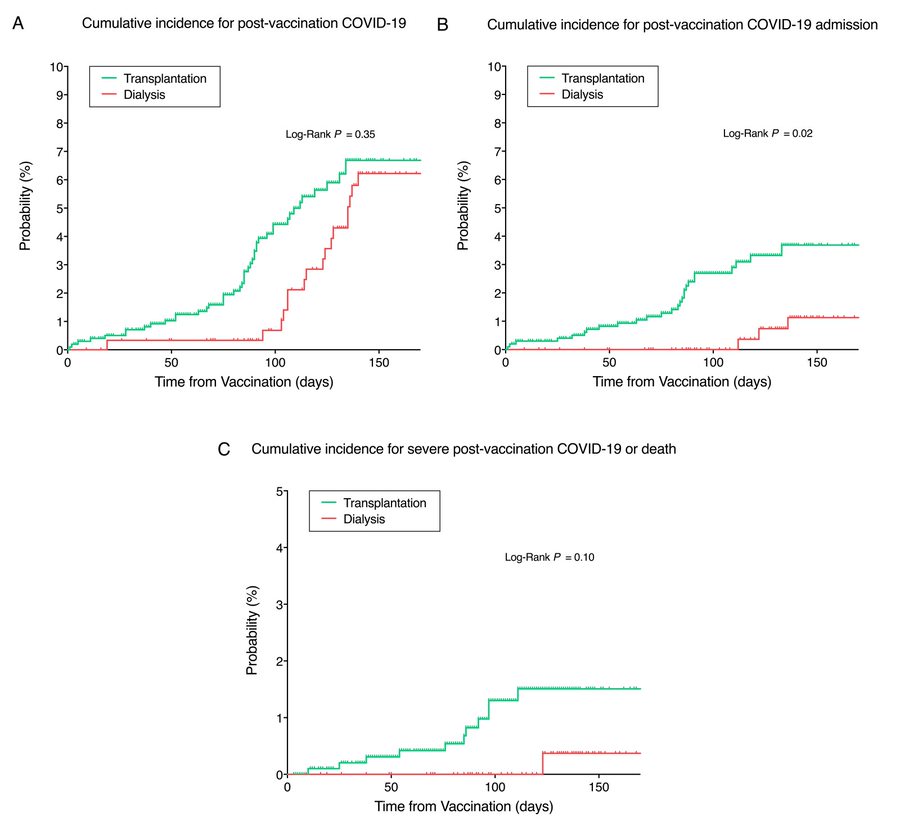Real-Life Prevention of Breakthrough SARS-CoV-2 Infections by mRNA Vaccines in Kidney Transplant Recipients vs Hemodialysis Patients
D. Rodríguez-Espinosa, E. Montagud-Marrahi, J. Cacho, C. Arana, N. Taurizano, E. Hermida, J. Del Risco, J. Casals, A. Rosario, E. Cuadrado, N. Rodríguez, I. Revuelta, B. Bayès, P. Ventura-Aguiar, F. Cofan, E. Poch, F. Oppenheimer, M. Vera, L. Rodas, F. Maduell, F. Diekmann, A. Cases, J. Broseta, D. Cucchiari
Nephrology and Renal Transplantation, Hospital Clinic of Barcelona, Barcelona, Spain
Meeting: 2022 American Transplant Congress
Abstract number: 1641
Keywords: COVID-19, Efficacy, Kidney transplantation, Vaccination
Topic: Clinical Science » Infection Disease » 24 - All Infections (Excluding Kidney & Viral Hepatitis)
Session Information
Session Name: All Infections (Excluding Kidney & Viral Hepatitis) IV
Session Type: Poster Abstract
Date: Tuesday, June 7, 2022
Session Time: 7:00pm-8:00pm
 Presentation Time: 7:00pm-8:00pm
Presentation Time: 7:00pm-8:00pm
Location: Hynes Halls C & D
*Purpose: The increased COVID-19 severity observed in kidney transplant recipients (KTR) has been widely reported. In addition, several studies have shown a reduced humoral and cellular response after mRNA vaccination in this population compared to hemodialysis patients. However, there is currently no information on real-life clinical protection (deaths and hospitalizations), a gap that this study aims to fill.
*Methods: Observational prospective study. A total population of 1336 KTR and hemodialysis patients from three dialysis units affiliated to Hospital Clínic of Barcelona, Spain, vaccinated with two doses of mRNA-1273 (Moderna) or BNT162b2 (Pfizer-BioNTech) SARS-CoV-2 mRNA vaccines. The outcomes measured were SARS-CoV-2 infection diagnosed by a positive RT-PCR fourteen days after the second vaccine dose, hospital admissions derived from infection, and a severe COVID-19 composite outcome, defined as either ICU admission, invasive and non-invasive mechanical ventilation, or death.
*Results: Six per cent (18/302) of patients on hemodialysis were infected, of whom four required hospital admission (1.3%), only one (0.3%) had severe COVID-19, and none of them died. In contrast, 4.3% (44/1034) of KTR were infected, and presented more hospital admissions (26 patients, 2.5%), severe COVID-19 (11 patients, 1.1%) or death (4 patients, 0.4%). There were no correlations on the multivariate analysis between measured outcomes and baseline characteristics nor immunosuppressive treatment.
*Conclusions: The study highlights the need for further booster doses in KTR. In contrast, the hemodialysis population appears to have an adequate clinical response to vaccination, at least up to four months from its administration.
To cite this abstract in AMA style:
Rodríguez-Espinosa D, Montagud-Marrahi E, Cacho J, Arana C, Taurizano N, Hermida E, Risco JDel, Casals J, Rosario A, Cuadrado E, Rodríguez N, Revuelta I, Bayès B, Ventura-Aguiar P, Cofan F, Poch E, Oppenheimer F, Vera M, Rodas L, Maduell F, Diekmann F, Cases A, Broseta J, Cucchiari D. Real-Life Prevention of Breakthrough SARS-CoV-2 Infections by mRNA Vaccines in Kidney Transplant Recipients vs Hemodialysis Patients [abstract]. Am J Transplant. 2022; 22 (suppl 3). https://atcmeetingabstracts.com/abstract/real-life-prevention-of-breakthrough-sars-cov-2-infections-by-mrna-vaccines-in-kidney-transplant-recipients-vs-hemodialysis-patients/. Accessed February 25, 2026.« Back to 2022 American Transplant Congress

